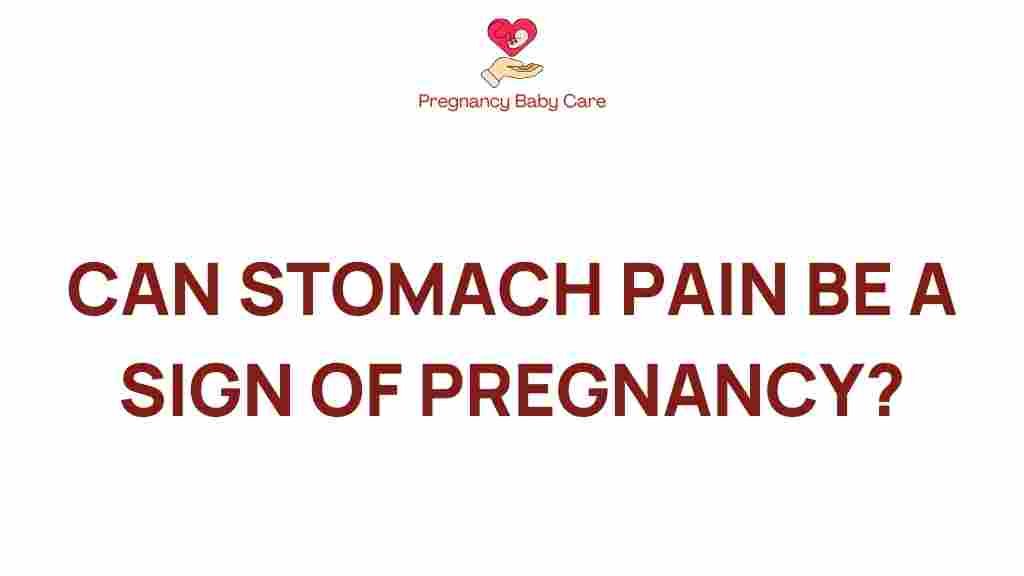Is Your Stomach Pain a Hidden Sign of Early Pregnancy?
For many women, stomach pain can be an unsettling experience, often leading to a flurry of questions and concerns. One of the most significant possibilities that can arise from abdominal discomfort in women of childbearing age is early pregnancy. Understanding the connection between stomach pain and early pregnancy is crucial for pregnancy awareness and women’s health. In this article, we will explore the common symptoms of early pregnancy, how hormonal changes affect your body, and what you should do if you experience stomach pain.
Understanding Stomach Pain in the Context of Early Pregnancy
Stomach pain can manifest in various forms, and its causes can range from minor digestive issues to more significant health concerns. When it comes to early pregnancy, abdominal discomfort may be one of the first signs indicating that something is changing in your body. Here’s a more detailed look at how stomach pain can relate to early pregnancy:
- Implantation Pain: When the fertilized egg implants itself into the uterine lining, some women may experience mild cramping or discomfort.
- Hormonal Changes: The body undergoes numerous hormonal changes during early pregnancy, which can lead to gastrointestinal discomfort, bloating, and cramping.
- Other Symptoms: Stomach pain can also coincide with other early pregnancy symptoms, such as nausea, fatigue, and breast tenderness.
Common Symptoms of Early Pregnancy
Recognizing the signs of early pregnancy can help you understand whether your stomach pain might be related to this life-changing event. Here’s a breakdown of the most common symptoms:
- Missed Period: One of the most common indicators of early pregnancy is a missed menstrual cycle.
- Nausea: Often referred to as “morning sickness,” this can occur at any time of day.
- Breast Changes: Many women experience breast tenderness, swelling, or darkening of the areolas.
- Increased Urination: Hormonal changes can lead to more frequent trips to the bathroom.
- Fatigue: The body is working hard to support the developing fetus, leading to increased tiredness.
- Food Cravings or Aversions: Sudden changes in food preferences can signal early pregnancy.
How Hormonal Changes Affect Your Body
During early pregnancy, a woman’s body undergoes significant hormonal changes that can impact various systems, including the digestive system. These hormonal fluctuations can lead to:
- Relaxation of Muscles: Progesterone, a key pregnancy hormone, relaxes smooth muscles, including those in the digestive tract, leading to slower digestion and potential discomfort.
- Increased Sensitivity: Women may become more sensitive to digestive changes and pain as hormones affect nerve sensitivity.
- Changes in Appetite: Hormonal shifts can also alter appetite and eating habits, contributing to stomach pain.
Step-by-Step Process: Identifying the Cause of Stomach Pain
If you experience stomach pain and suspect early pregnancy, follow these steps to identify the cause:
- Track Your Symptoms: Keep a diary of your symptoms, noting when they occur and their severity.
- Check for Other Pregnancy Signs: Look for additional symptoms such as missed periods or nausea.
- Take a Pregnancy Test: If you suspect pregnancy, consider taking a home pregnancy test or consulting a healthcare provider.
- Consult a Healthcare Professional: If stomach pain persists or worsens, seek medical advice to rule out other conditions.
When to Seek Medical Attention
While stomach pain can be a normal symptom during early pregnancy, there are instances when it is crucial to seek medical attention. You should consult a healthcare provider if you experience:
- Severe or persistent abdominal pain
- Heavy bleeding or spotting
- Severe nausea or vomiting
- Dizziness or fainting
- Pain during urination
Troubleshooting Tips for Managing Stomach Pain
Managing stomach pain, especially when it could be related to early pregnancy, involves a combination of self-care and medical advice. Here are some troubleshooting tips:
- Stay Hydrated: Drink plenty of water to help alleviate discomfort and reduce bloating.
- Eat Smaller Meals: Instead of three large meals, try eating smaller, more frequent meals to ease digestive strain.
- Avoid Trigger Foods: Identify and avoid foods that may exacerbate your stomach pain.
- Practice Relaxation Techniques: Stress can contribute to abdominal discomfort. Techniques like deep breathing or yoga may help.
- Consult a Physician: Always seek professional advice if stomach pain is severe or accompanied by other concerning symptoms.
Conclusion: Staying Informed About Pregnancy Health
Understanding the relationship between stomach pain and early pregnancy is essential for any woman who is trying to conceive or suspects she might be pregnant. By being aware of the common pregnancy signs and symptoms, you can make informed decisions about your health and well-being. Always remember that if you are experiencing unusual or severe symptoms, you should consult a healthcare professional for personalized advice.
For more information on women’s health and pregnancy, consider visiting the American Pregnancy Association website, which offers valuable resources and guidance. Additionally, for personal stories and experiences related to pregnancy health, you might find helpful insights on various women’s health blogs.
This article is in the category Pregnancy and created by PregnancyBabyCare Team
